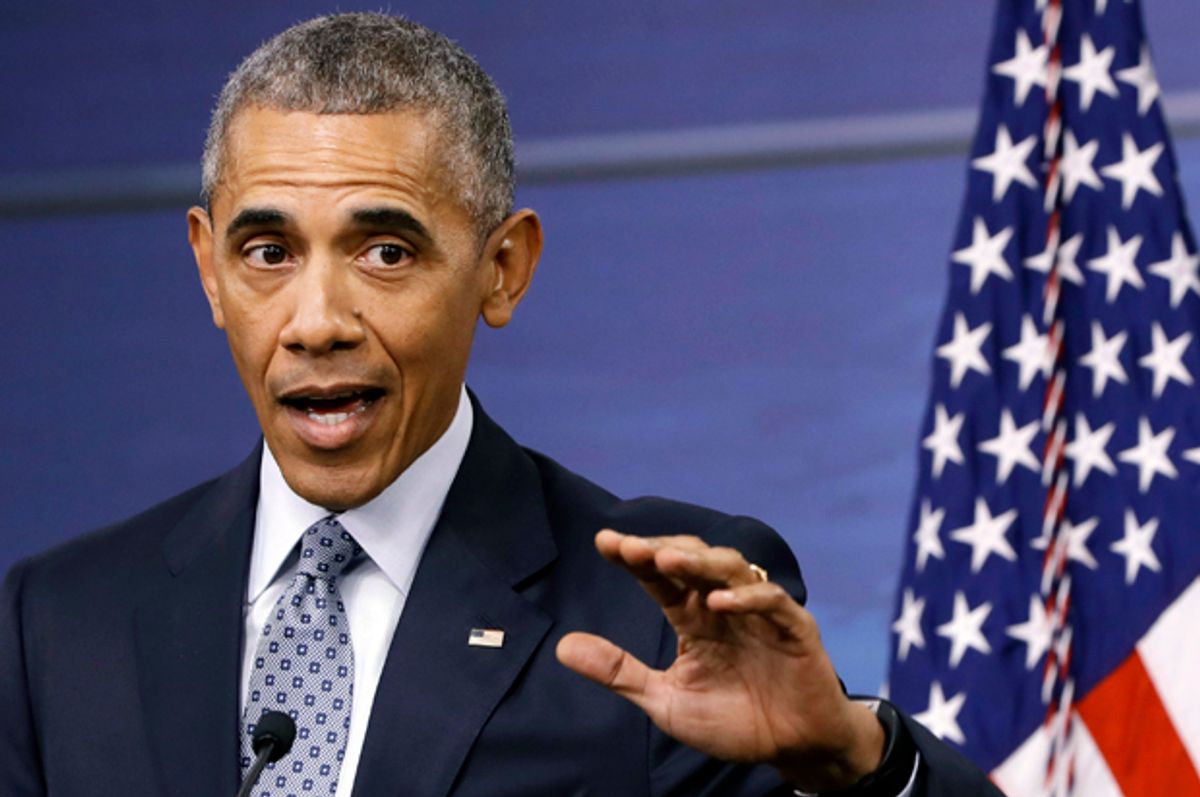Someone forgot to tell Barack Obama that he’s a lame-duck president who should put his feet up and relax while perusing the Learning Annex catalog for intro to painting classes. Instead, Obama has continued to work.
On Wednesday, the White House announced that Obama has commuted the sentences of 111 federal inmates, including 35 serving life sentences. The prisoners were all nonviolent drug offenders and many had been sentenced under mandatory minimums and other guidelines no longer in effect today. In other words, they would have received much lighter sentences had they been convicted in 2016 instead of, say, the 1990s.
This announcement may have been overshadowed by Donald Trump's managing to meet Mexico’s president without peeing on his leg like a frightened puppy, but we should not overlook its importance. Obama had already commuted the sentences of another 214 prisoners earlier in August. He has now granted clemency to 673 federal prisoners during his two terms in office, more than the previous 10 presidents combined.
Still, there seemed to be little outcry in reaction to Obama’s actions. Is it too much to hope that we have finally turned a corner in the war on the war on drugs or that the public’s growing awareness of the inequities involved is finally leading to some action?
Consider the following:
- Obama’s announcement followed Tuesday’s primary losses across the country by strict law-and-order district attorneys, most notably the egregious Angela Corey in Florida.
- The commutations come on the heels of a Democratic primary season in which the issue of mass incarceration and the pernicious results of the crime bill signed into law by former President Bill Clinton in 1994 were a major flashpoint between the two candidates. Which resulted in the winning candidate, Hillary Clinton, moving significantly to the left on the issue.
- Thanks to the efforts of Black Lives Matter and other activists, the Democratic Party adopted the most progressive platform language on criminal justice reform in generations.
- The president has made issues of criminal justice reform, including sentencing reform for nonviolent drug offenders, a major part of his second-term agenda. This has happened not just in symbolic ways — Obama was the first president to ever visit a federal prison — but in tangible reforms realized through executive actions and miraculously getting the Senate to write legislation. Even House Speaker Paul Ryan has said that criminal justice reform will be on the House’s agenda when it reconvenes after Labor Day.
Of course, getting Congress to pass any significant bills these days is a heavy lift, which is why the president is using executive actions, including the wide-ranging commutation power the Constitution grants him. Still, this sort of reform is one that the libertarian wing of the GOP, small as it is, has for years pushed for. So, baby steps.
As NPR has reported, the initiative on commutations for nonviolent drug offenders has a long way to go. The White House and the Justice Department kicked it off two years ago and were quickly inundated with applications from people sentenced for other crimes. Each case has to be individually reviewed, and there is real doubt that the government will be able to finish that process before Obama leaves office in January.
Also, despite the relative quiet of the right this week, the Republican platform adopted at the party's convention still contains harsh language. The Republican Party itself is still caught between its law-and-order wing, which reacts angrily to every episode of civic disturbance and protest (see the rhetoric over NFL quarterback Colin Kaepernick’s national-anthem stance this week), and some of its senior members and donors, who recognize the need for reform. Reconciling those wings of the party will not be easy, if doable at all.
Still, the movement we have seen on this issue from Obama and the Democrats, while frustratingly slow for those still trapped inside the system, is at least cause for optimism that the changing tide of public opinion will finally lead to concrete changes. It will be up to activists to keep the issue a priority with the next administration, but we should recognize the progress made by this one.

Shares